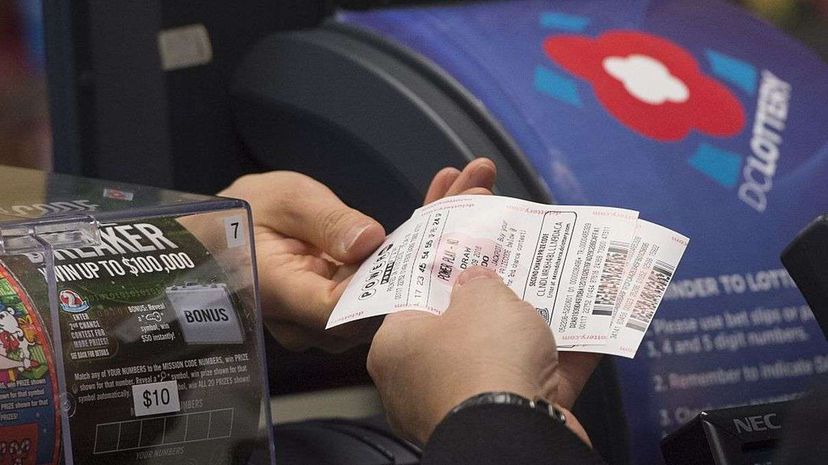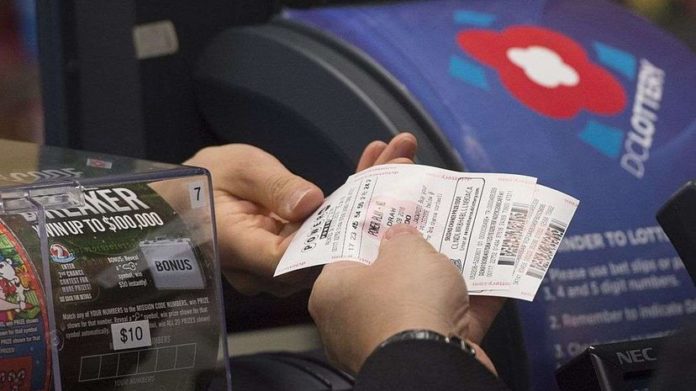 “A man purchases a Powerball lottery ticket at a convenience store in Washington, D.C. Tuesday’s jackpot will be $620 million. SAUL LOEB/AFP/Getty Images
“A man purchases a Powerball lottery ticket at a convenience store in Washington, D.C. Tuesday’s jackpot will be $620 million. SAUL LOEB/AFP/Getty Images
Stop reading this article and drive directly to the nearest gas station. The Powerball lottery jackpot has hit $750 million. Even if you know for a fact that the odds of winning Powerball (one in 292,201,338) or Mega Millions, for that matter, (one in 302,575,350) are far worse than being eaten by a shark or being elected president, buying a $2 Powerball or Mega Millions ticket seems like a small price to pay for the chance to be stupidly rich.
And you’re not alone. According to calculations by the statistics nerds at FiveThirtyEight, the number of people who play Powerball or Mega Millions increases exponentially with the cash value of the jackpot. The bigger the payoff, in other words, the more suckers (er, people) play.
Here’s how it works. Let’s focus on Powerball, for the sake of keeping it simple. Every time someone wins the Powerball, the jackpot resets to $40 million. According to data from LottoReport.com, only diehard Powerball players buy tickets when the jackpot is below $100 million. Above that milestone, ticket sales begin to rise quickly. But the real "tipping point," says the FiveThirtyEight folks, occurs around $250 million, when "regular Joe" office workers start pooling cash and sales blow up to over 200 million Powerball tickets per drawing.
These numbers sound about right to Gary Miller, spokesman for the Pennsylvania Lottery, one of 44 state lotteries (plus D.C., Puerto Rico and the U.S. Virgin Islands) that participate in Powerball.
"There is definitely a ‘sweet spot’ for jackpot size when it comes to motivating players," Miller says. "It used to be in the $200 million range, but now players seem to really engage when a jackpot reaches $300 million or above."
The lottery is big business. In 2016, Americans spent $72.6 billion on lottery games, or $223.04 per American. But don’t think for a minute that the Multi-State Lottery Association (MUSL), which operates Powerball, doesn’t want us to spend even more.
On Oct. 7, 2015, the MUSL announced some changes to its Powerball "gaming matrix" that substantially decreased the odds of winning the Powerball grand prize from one in 175,223,510 to one in 292,201,338. The harder it is to win, the more the jackpot grows. And the more the jackpot grows, the more people buy tickets.
Miller of Pennsylvania Lottery confirms that the October odds change was made because "we do know that Powerball players are increasingly motivated by larger jackpots."
And let’s not forget another compelling reason why more Powerball tickets are sold when there’s a big fat jackpot — articles like this! Every time the Powerball reaches a big round number like $300 million or $500 million, the press pounces on the story. A Google search on Monday, March 25, 2019, for "Powerball jackpot" generated 23,500,000 results. Even folks who never considered playing the lottery might start to feel lucky when they read headline after headline about a ‘record-breaking’ jackpot.
So here’s the $750 million question: Will you buy a Powerball ticket? Sure, the odds of winning the jackpot are roughly the same as pulling your name out of a hat filled with the names of every man, woman and child in America. But if you don’t buy a ticket, your odds are infinitely worse.
Now That’s Crazy
In 2013, Mindy Crandell of Zephyrhills, Florida, was in line to buy a Powerball ticket when an older woman stepped ahead of her. Crandell, who was busy tending one of her two daughters, told the woman to "go ahead." Friends joked that Crandell’s generosity would cost her the $590.5 million jackpot, the largest ever at the time. And it did! The line-cutter, 84-year-old Gloria C. McKenzie, is currently the biggest lone Powerball winner in history.










































